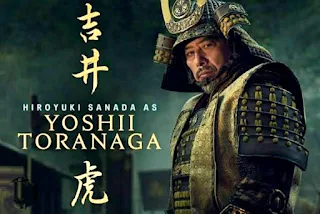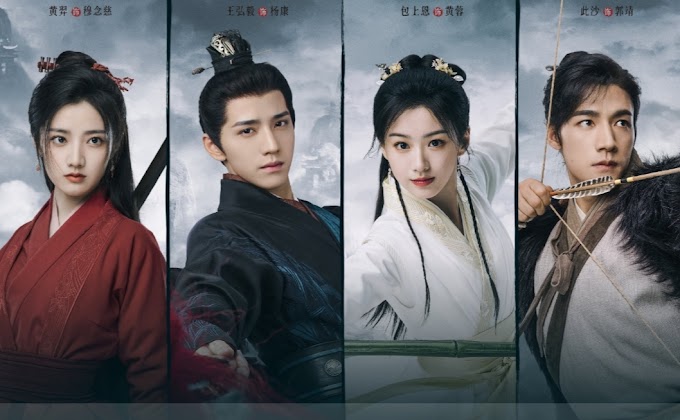FX Production, the successor of the Fox Network Group, and a subsidiary of Disney Entertainment, produced Shōgun with Michael De Luca production.
It is a gripping historical television miniseries based on the 1975 novel of the same title by James Clavell. Each episode has different directors and scriptwriter(s).
Despite an American production, it still feels like an Asian drama because the setting is ancient Japan, most of the characters are played by Japanese actors, and more than 50% of the dialogues are in Japanese so it still sounds like an Asian series.
Shōgun premiered on February 27, 2024, on Hulu and FX, with an hour running time per episode. The final episode is expected to air on April 23, 2024.
It's a major hit globally with an almost perfect rating on the American review aggregator, Rotten Tomatoes. Viewers praised the brilliance of the production and the excellent acting performances of the cast.
A review in the British film magazine, Empire, said that the series "makes for gripping television. Look past the knotty bureaucracy and you'll find striking performances and stunning visuals", according to film reviewer Jake Cunnigham, praising the intricate performances of its lead trio.
 |
| Cosmo Jarvis as John Blackthorne |
Shōgun stars the internationally renowned Japanese actor, Hiroyuki Sanada as Lord Yoshii Toranaga, British actor Cosmo Jarvis as John Blackthorne, and the New Zealand-born Japanese actress Anna Sawai as Mariko.
The premise of Shōgun follows the collision of two men from different cultures and a mysterious female samurai.
Blackthorne is loosely based on the historical English navigator William Adams, who in Japan rose to become a samurai under the powerful daimyō, Tokugawa Ieyasu, who founded the first Shōgun of the Tokugawa Shogunate (military government) of Japan. He ruled during the Edo period in Japan, from 1603 to 1616. He was the basis of the character of Yoshii Toranaga.
 |
| Anna Sawai as Mariko |
Apart from the high-quality production and acting performances, the series received praise for its attention to detail in bringing to life the memories of old Japan and the rich Japanese culture.
Adjustments made for international viewers
However, the production crew made some adjustments in the script of the drama adaptation to make the series more appealing to international viewers, which, according to film reviewers, is one of the factors that drives the global popularity and the commercial success of this series.
The drama adaptation followed the historical accuracies presented in the book but had to change some multiple languages used in the book to English to appeal to the global audience.
The production made the drama as realistic as possible, so the Japanese characters must speak an accurate version of their native language.
However, the production needs to omit the large part of the Portuguese and Latin dialogues used in the book and change it to English so that the viewers would not be spending more time reading subtitles.
In the original source novel (James Clavell's book), most of the characters spoke Portuguese and Latin in addition to Japanese.
Japan during the 1600s had so many Portuguese Catholics who held a monopoly over trade between Japan and China. During this period, Japanese citizens were taught Portuguese so they could read the Bible and communicate effectively with the priests.
Catholic priests spoke Latin and held church services in Latin as this is the official language of the Roman Catholic church.
But this language element needed to be replaced with English. Producers thought that if the cast spoke Portuguese and Latin (just like in the book), it would be subtitled, which might not be appealing to the global audience as they would be compelled to read subtitles most of the time.
So the production decided to use English instead, leaving only the Japanese language to be subtitled. This was a commercial decision because the production had already committed to ensuring that the local language in Japan would take a large part in the show's dialogue.
As we all know, some international viewers find it distracting to read subtitles all throughout the show as it takes away their time watching the visuals. Thus, Shogun was made to make sure the show's visuals would not be overlooked by the viewers.
It's also a sensible decision to let them speak English as most of the cast members are non-Portuguese and non-Latin speakers.
Another decision is on John Blackthorne being multilingual. In the novel, Blackthorne is fluent in English, Dutch, Portuguese, Latin, and Spanish.
However, in the drama, the film crew lets Cosmo Jarvis speak English most of the time instead of switching from one language to another, to minimize putting subtitles.
This clever decision of the producers brings good to the show as it adds global appeal. International viewers don't have to spend time reading subtitles.
A gripping historical drama about cross-cultures
Shogun is an extraordinary series to watch. It's one of the best historical miniseries ever made in recent years that tackles cross-cultural issues.
Everything is so fantastic about this drama, from the acting performances to the technical aspects - screenplay, cinematography, visual effects, sound effects, and the detail of the weapons used. Everything is cinema-grade, so it feels like watching a historical movie in theaters.
Shōgun received critical acclaim worldwide. Rotten Tomatoes, a popular film and television review platform, gave the show 99% from 88 critics.
The site's critical consensus is, "Visually sumptuous and enriched with cultural verisimilitude, Shōgun is an epic adaptation that outdoes the original."
 |
| Hiroyuki Sanada |
Reception in Japan was also positive. Considering how critical domestic fans are to a drama that tackles their history, the positive reaction was a relief to the lead actor who also served as one of the producers, Hiroyuki Sanada.
He said: "I was a little worried about the Japanese reaction because they know what is authentic, and what is not. But surprisingly, all the reviews and the reactions from the audience were great. That was exactly what we wanted."
Shogun has 10 episodes all in all. Six episodes have already aired and the final episode is expected to release on April 23, 2024. Catch it on Hulu, FX, and disney+.
A piece of information about the history of Japan's Shoguns
Shōgun in Japanese history means "military ruler" or "army commander". It's the title of Japan's military commander from the 12th century down to the middle of the 19th century.
Shōguns yielded influence and political powers during the Shogunate period in Japan, acting like the rulers of the country. Their office in practice was hereditary.
The Shogunate ended in 1867 when the last Shogun, Tokugawa Yoshinobu relinquished his office to Emperor Meiji (during the Meiji restoration) when his plan of military reform failed.















0 Comments